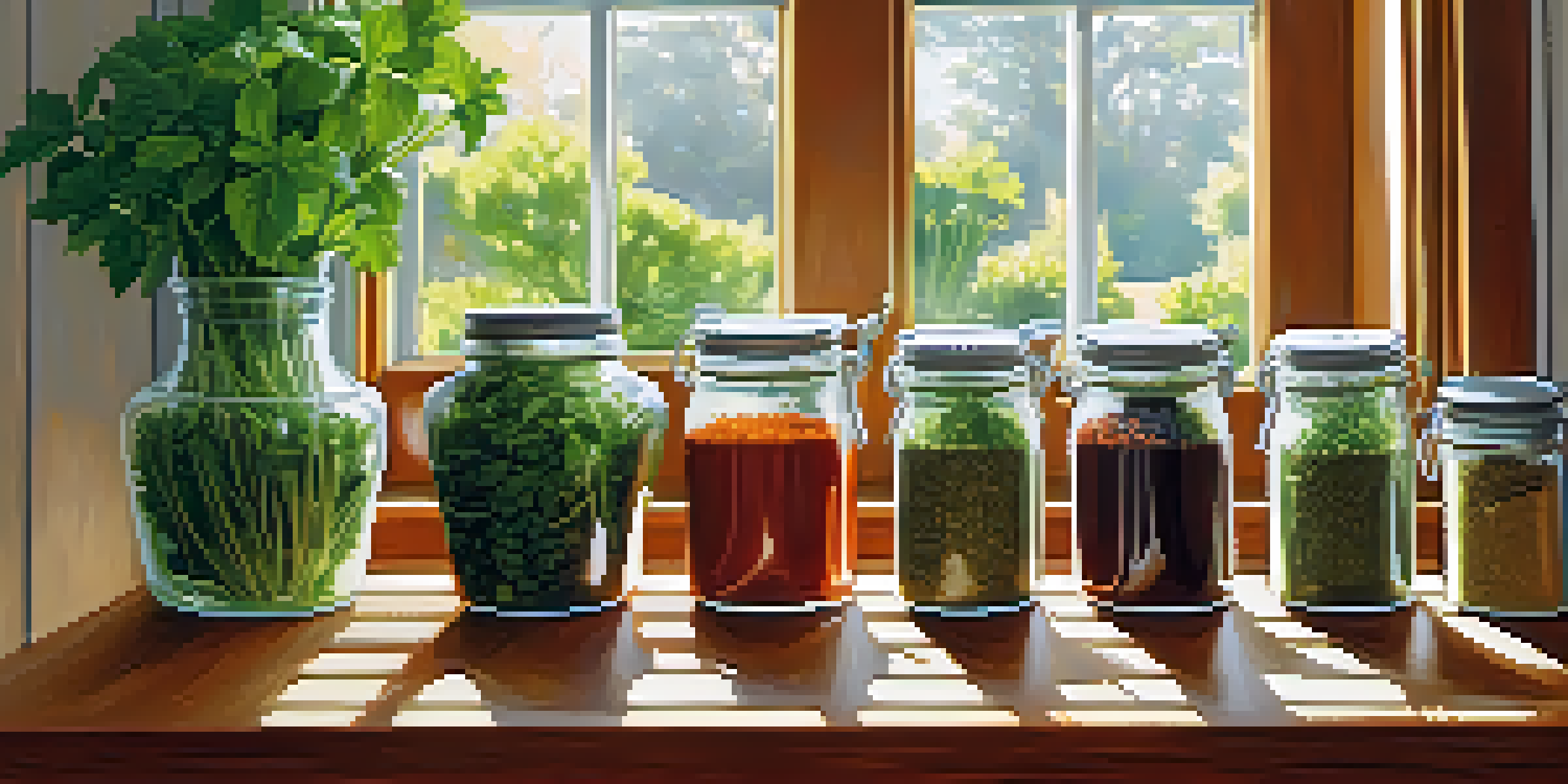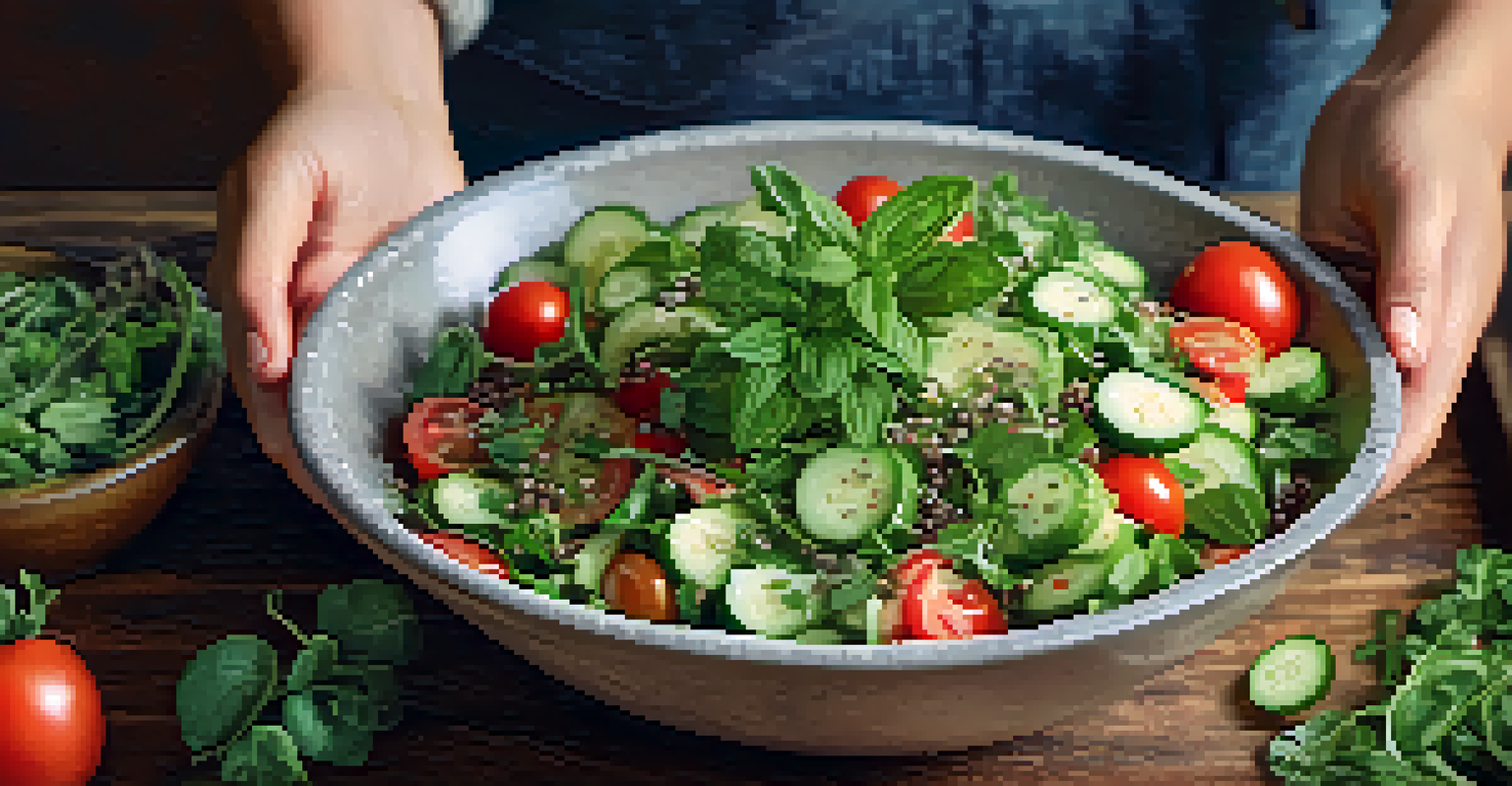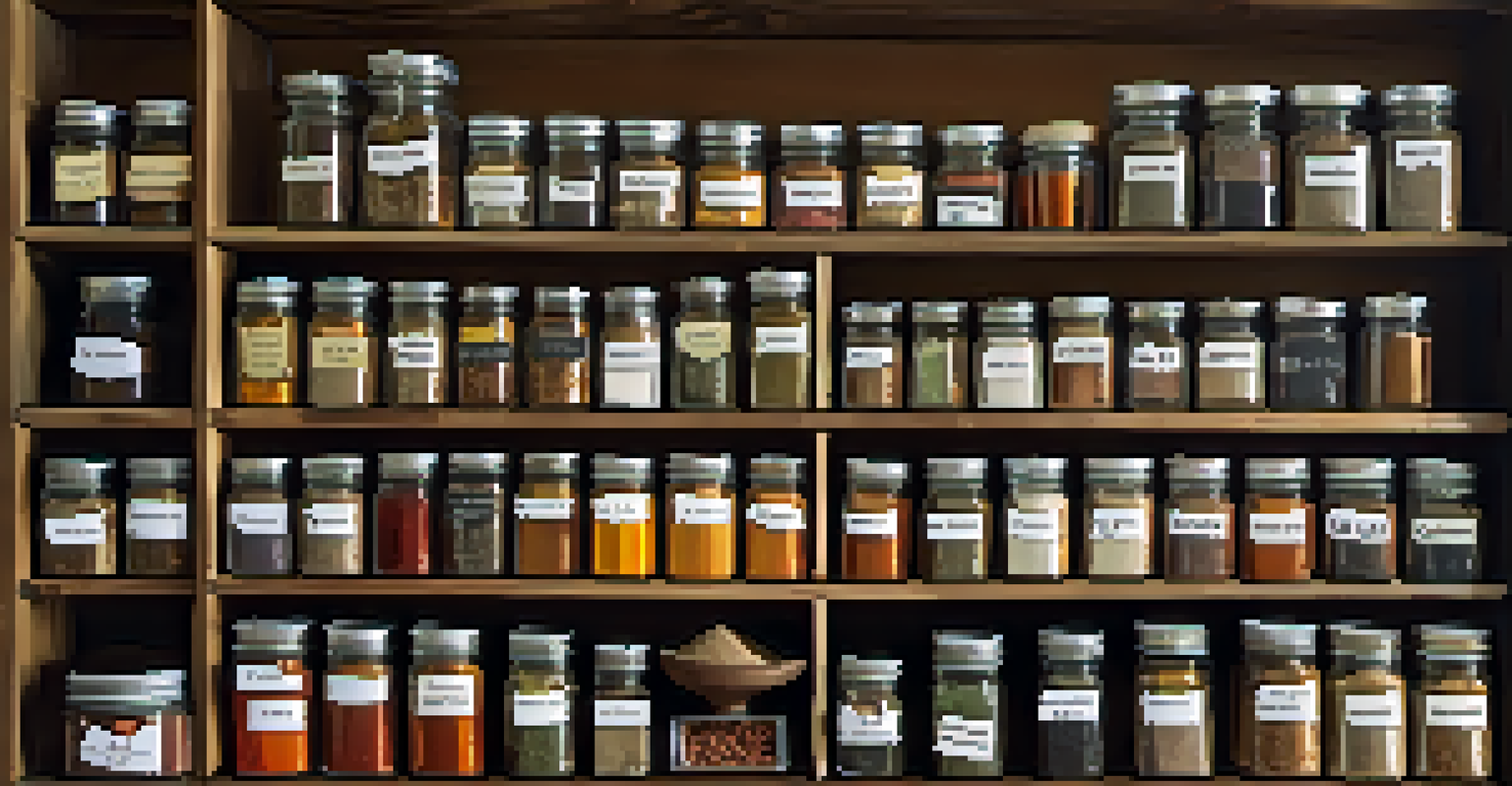Herbs and Spices: Elevate Your Dishes with Flavorful Additions

Understanding the Difference: Herbs vs. Spices
Herbs and spices are often used interchangeably, but they have distinct differences. Herbs come from the leafy green parts of plants, while spices are derived from seeds, roots, or bark. For instance, basil is an herb, whereas cinnamon is a spice. Recognizing these differences can help you select the right flavoring for your dishes.
Let food be thy medicine and medicine be thy food.
Using herbs like parsley or cilantro can add freshness and brightness to your meals, while spices like cumin or paprika introduce warmth and depth. This distinction is crucial when planning your dishes, as it can dramatically impact flavor profiles. Understanding how to use each can elevate your cooking to new heights.
Incorporating both herbs and spices not only enhances flavors but also adds visual appeal to your plates. A sprinkle of fresh herbs can brighten up a dish, while a dash of spice can provide that eye-catching color. So, the next time you cook, remember the importance of both elements in creating a well-rounded meal.
Health Benefits of Using Herbs and Spices
Beyond flavor, herbs and spices offer a plethora of health benefits. Many of them are rich in antioxidants, which can help combat oxidative stress in the body. For example, turmeric contains curcumin, known for its anti-inflammatory properties, making it a fantastic addition to your cooking.

Additionally, certain herbs like oregano and thyme are packed with vitamins and minerals. They can boost your immune system, promote digestion, and even enhance heart health. By integrating these flavorful additions into your diet, you’re not just making your meals tastier but also healthier.
Herbs vs. Spices Explained Simply
Herbs are leafy greens while spices come from seeds, roots, or bark, each adding unique flavors to your dishes.
Moreover, using herbs and spices can be a great way to reduce sodium intake. Instead of relying on salt for flavor, experimenting with various herbs and spices can help you create delicious dishes without compromising your health. It’s a win-win situation!
How to Select Fresh Herbs and Spices
When it comes to selecting herbs and spices, freshness is key. Fresh herbs should be vibrant and fragrant, with no signs of wilting or browning. Always smell them before buying; if they have a strong aroma, they’re likely to be fresh and flavorful, ready to enhance your dishes.
Cooking is like love. It should be entered into with abandon or not at all.
For dried spices, check the packaging date if possible. Spices lose their potency over time, so older spices may not deliver the flavor punch you’re seeking. A good rule of thumb is to replace dried spices every six months to a year for optimal taste.
Lastly, consider growing your own herbs at home! Not only does this guarantee freshness, but it also allows you to explore new flavors right from your garden. With just a little sunlight and care, you can have a wonderful selection of herbs at your fingertips.
Creative Ways to Incorporate Herbs and Spices
Incorporating herbs and spices into your cooking doesn’t have to be complicated. Start by adding them to simple dishes like salads, where fresh herbs can really shine. A sprinkle of basil or mint can transform a basic salad into a refreshing delight.
Spices can be introduced into your cooking at various stages. For example, adding spices like cumin or coriander early in the cooking process allows their flavors to deepen, while adding them towards the end can provide a more pronounced taste. Experimenting with timing can elevate your culinary creations.
Health Benefits of Flavors
Many herbs and spices are rich in antioxidants and vitamins, promoting overall health while enhancing the taste of your meals.
Don't shy away from using herbs and spices in unexpected places! Try adding cinnamon to your chili or rosemary to your bread dough. The possibilities are endless and can lead to delicious discoveries that excite your palate.
Common Culinary Herbs and Their Uses
Some herbs are staples in kitchens around the world, and for good reason! Basil is a key ingredient in Italian dishes, giving pasta sauces a fresh, aromatic flavor. Meanwhile, cilantro is often used in Mexican and Asian cuisines for its bright and zesty notes.
Other popular herbs include oregano, which adds a warm, earthy flavor to pizza and marinades, and parsley, often used as a garnish but also great in salads and sauces. Each herb brings its own unique characteristics, allowing for endless creativity in your cooking.
When using herbs, consider pairing them with other ingredients that complement their flavors. For example, pairing dill with fish or rosemary with roasted meats can enhance the overall dish. Experimenting with combinations can lead to delightful culinary surprises.
Must-Have Spices for Every Kitchen
Certain spices can be considered essentials in any kitchen. For instance, black pepper is a classic that adds a subtle heat to almost any dish. Similarly, garlic powder is a versatile choice that can enhance flavors without the hassle of fresh garlic.
Cumin is another must-have, especially for those who enjoy dishes from Middle Eastern or Indian cuisines. Its warm, earthy flavor can elevate stews, curries, and even roasted vegetables. Having these spices on hand can simplify meal preparations and expand your culinary repertoire.
Storage Tips for Freshness
Properly storing herbs and spices is essential to maintain their freshness and flavor, ensuring your dishes always taste their best.
Lastly, don't forget about chili powder or cayenne pepper for those who enjoy a kick of heat! These spices can add depth and excitement to your meals, making them unforgettable. Stocking up on these essentials will ensure you're ready to tackle any recipe that comes your way.
Storing Herbs and Spices for Longevity
Proper storage of herbs and spices is crucial to maintaining their freshness and potency. Fresh herbs should be kept in the refrigerator, ideally wrapped in a damp paper towel and placed in a plastic bag. This helps retain moisture and prevents wilting.
For dried spices, store them in airtight containers away from light, heat, and humidity. A cool, dark pantry is ideal. This can prevent them from losing flavor over time, ensuring that every sprinkle counts when you cook.

Additionally, consider labeling your spices with the purchase date. This can help you keep track of when to replace them, ensuring that you always have the freshest flavors at your disposal. Taking these simple steps can make a significant difference in your cooking experience.